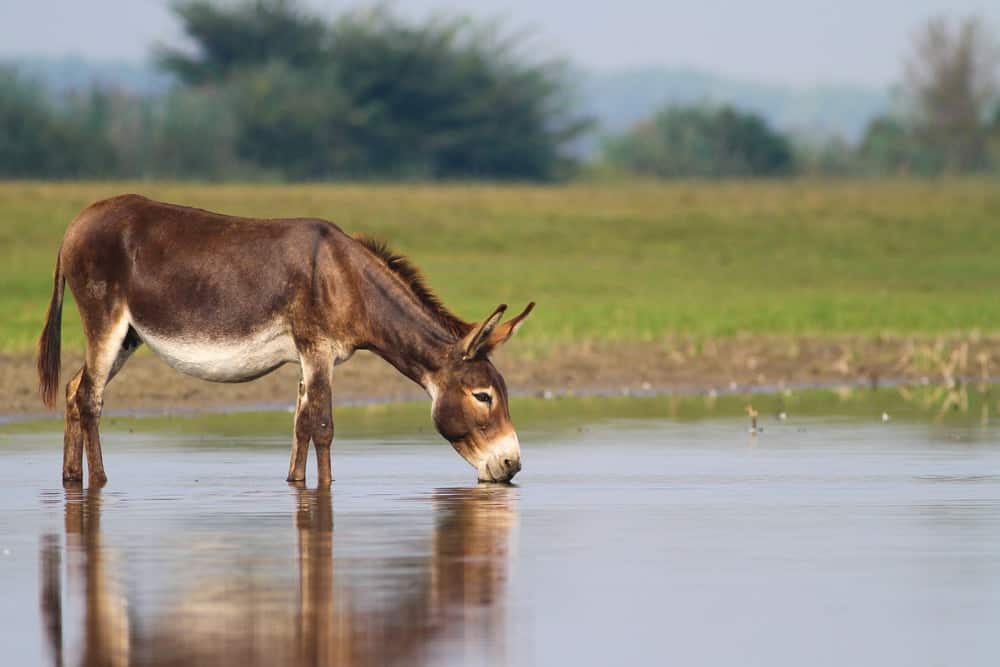Why Are Donkeys Hesitant About Water?
Can You Train a Donkey to Swim?
Facts About Donkeys
[/jump-links]
Donkeys are known for being hardy, courageous, and a bit stubborn. Humans have relied on donkeys for thousands of years. While they are commonly associated with horses since they have some similarities and can even interbreed, they are very different species with different capabilities.
It’s no secret that donkeys have a level of hardiness on the land that led humans to use them for a variety of tasks, but does that carry over into the water? The truth is donkeys can swim, but they are very hesitant to go into the water. Let’s learn more.

Are Donkeys Good Swimmers?
Donkeys have a natural instinct to swim and while they typically won’t bother entering the water in the first place, if they are already in the water, they will begin swimming as soon as they lose their foothold. Like horses, donkeys have large lungs that provide them with some buoyancy but only enough to keep their head above the water.
While they are decent swimmers, they are not powerful swimmers. After all, they are land animals with an ancestry of arid, desert living. They will only swim if they must and will do so by balancing their heavy bodies by keeping forward momentum in the water by using a paddling motion.
Donkeys have been known to cross rivers and streams with manageable loads on their backs. If they can keep their head above the water, they are capable of swimming effortlessly over short distances.
It is very dangerous if the nostrils or ears become submerged as they are swimming, as it could startle them and cause panic that could potentially lead to drowning.
Why Are Donkeys Hesitant About Water?
While donkeys are often compared to horses, they have some very significant differences. Horses tend to be much more comfortable in the water overall. The coat of a donkey also differs significantly from a horse.
Donkeys have the same coat length throughout all seasons and lack the oils that make the horse’s coat more water-resistant. This is one reason you will notice donkeys hovering under shelter during the rain.
Not only do donkeys become drenched when submerged in water, which isn’t exactly comfortable, but they also have an incredible sense of self-preservation. While they come equipped with a great deal of courage and fearlessness, they understand that water is not their natural environment and poses a threat to their safety.
The survival instinct runs deep in the animal kingdom and any potential threat is often avoided. Unless a donkey feels comfortable in the water, it’s unlikely it’ll ever go for a swim.
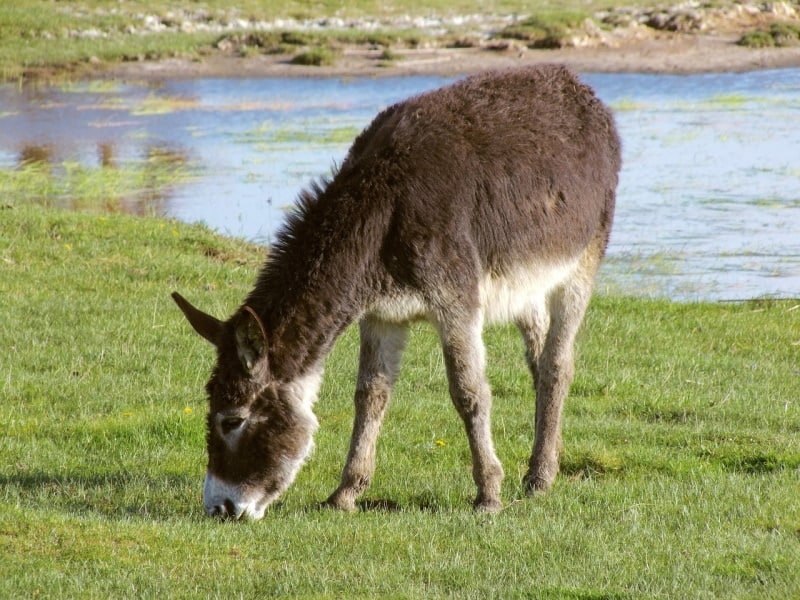
Can You Train a Donkey to Swim?
Training a donkey is heavily reliant on the trust that you build with the individual. You will not be able to force a donkey to swim against its will if it is in fear for its safety. Each donkey is unique and will have its own personality traits, so you must establish a mutual bond.
Once you have established trust with your donkey, you can introduce them to larger bodies of water to see how they respond. Take them to the edge of the water and allow them to become familiar with it on their own. You can even step into the water yourself and show them that it’s nothing to be afraid of.
Take your time and have patience during the process. Some donkeys may never willingly go into the water, but there’s a chance you can convince certain individuals to be comfortable exploring the water and going for a swim.

Top 7 Interesting Facts About Donkeys
1. Those Large Ears Keep Them Cool
The domesticated donkeys that we all know and love today share ancestry with wild asses that come from the hot, dry conditions of Africa and Asia. Their extra-large ears are not only meant to provide a heightened sense of hearing across long distances but also help them properly expel their internal heat in those hot desert conditions.
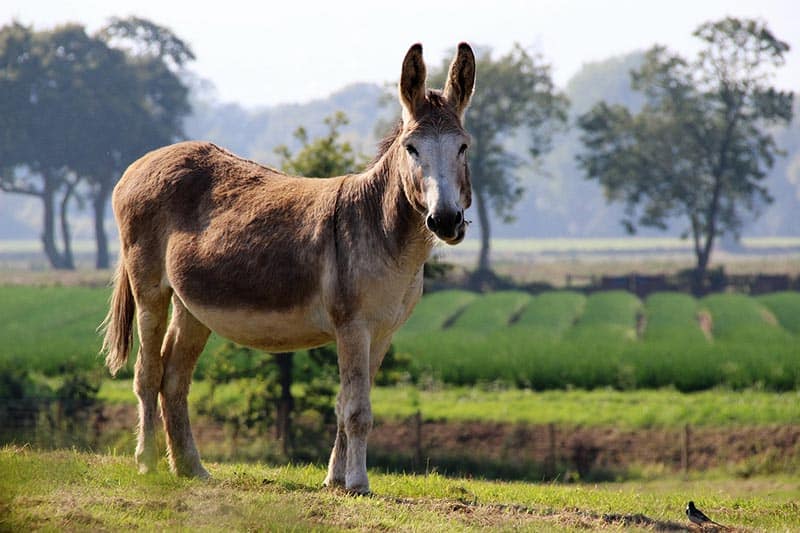
2. They Are Very Social
Donkeys are herd animals by nature and do not like to be alone. They form lifelong bonds with their pasture mates, which can also include other species. Donkeys often form what is known as a pair bond, where two individuals become very closely bonded to the point where they can experience negative health impacts if they become separated.
Donkeys should never have to live alone and should always have at least one other pasture mate in their lives. Their sociability makes them great pasture mates for a variety of livestock, which is why they are often chosen as companions for other animals.
3. Donkeys Make Great Guardians
Not only do these creatures make excellent pasture mates and companions but they are also incredible guardians. Donkeys are often placed with sheep and other livestock because they have natural aggression toward predators and will defend their pasture mates.
Donkeys have been known to chase away dogs, foxes, coyotes, and bobcats to keep their companions safe. Herds of sheep and goats have been observed gravitating toward their donkey friends when they notice a threat nearby.
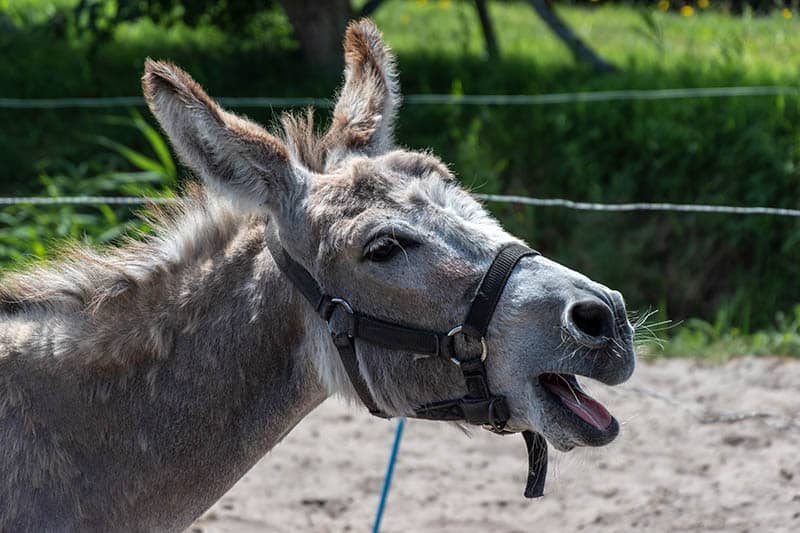
- See Also: Do Donkeys and Goats Get Along?
4. Their Stubbornness Has a Purpose
The donkey is incredibly intelligent and analytical and can come off as a bit stoic. Their stubbornness is one of their most well-known traits and while it may make them a bit difficult to train in some cases, it is every bit about self-preservation.
Donkeys aren’t nearly as fearful or flighty as horses, so rather than attempting to flee, they will remain locked in place if someone tries to force them into something they aren’t convinced is in their best interest.
5. Their Ancestors Are Endangered
There are two species of Wild Ass, the Asiatic Wild Ass, and the African Wild Ass. Domesticated donkeys descended from African Wild Asses, which are critically endangered. There are many conservation efforts currently in place to prevent the extinction of the species. Once widespread throughout Northern Africa, there are believed to be as little as 250 or fewer left in the wild.

6. Donkeys Have a Long History with Humans
The donkey was first domesticated around 6,000 years ago in Northern Africa and Ancient Egypt for the purpose of meat and milk. These durable, strong, and drought-tolerant equines also proved their ability to be more than a food source. Donkeys took on a major role in carrying supplies and trading items across long distances.
While they are still used in some places around the world for this purpose, modern technology has advanced to the point that most cultures no longer require them for the hard work they were once tasked with. They are now more commonly used as livestock guardians and pasture mates for other animals.
7. They Have an Incredible Memory
You’ve likely heard the phrase “an elephant never forgets,” but it seems donkeys aren’t given the credit they deserve in the memory department. They are often viewed as goofy and loud, but these remarkable creatures have quite an impressive memory. Individuals have been noted to recognize others after over 25 years of separation. They have also shown to have excellent problem-solving skills, so if you’re ever compared to a donkey, try and take it as a compliment.
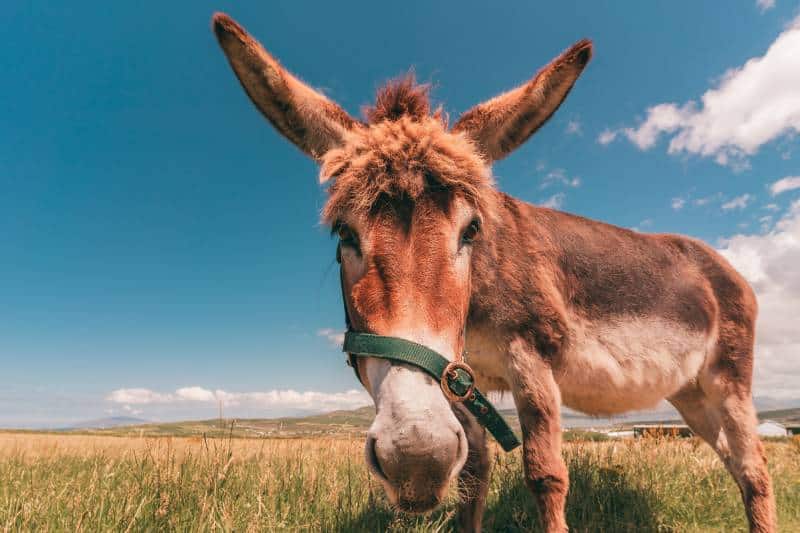

Conclusion
Donkeys can swim but they are typically very hesitant to do so. Donkeys have excellent survival skills and understand that swimming puts them at risk. They can learn to become comfortable enough to enter the water and are decent swimmers over short distances. They have enough buoyancy with their large lungs to keep their heads above water, so you shouldn’t worry too much if your donkey decides to go for a swim.
- See Also: Can Horses Swim? Interesting Facts & FAQ
Featured Image Credit: Jeevan, Pixabay
